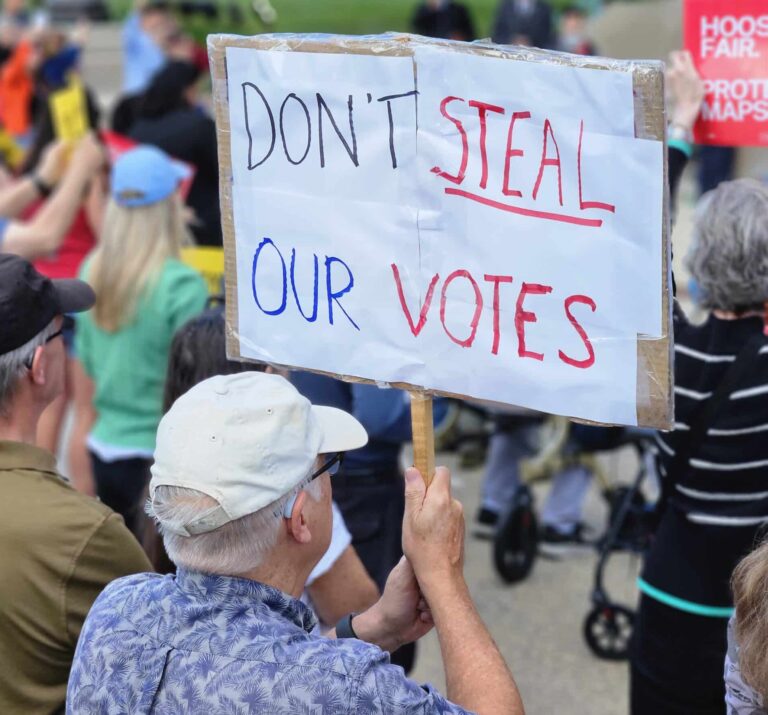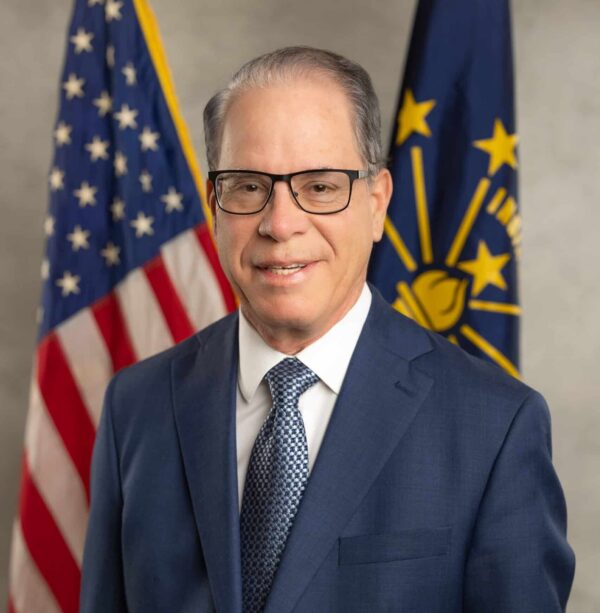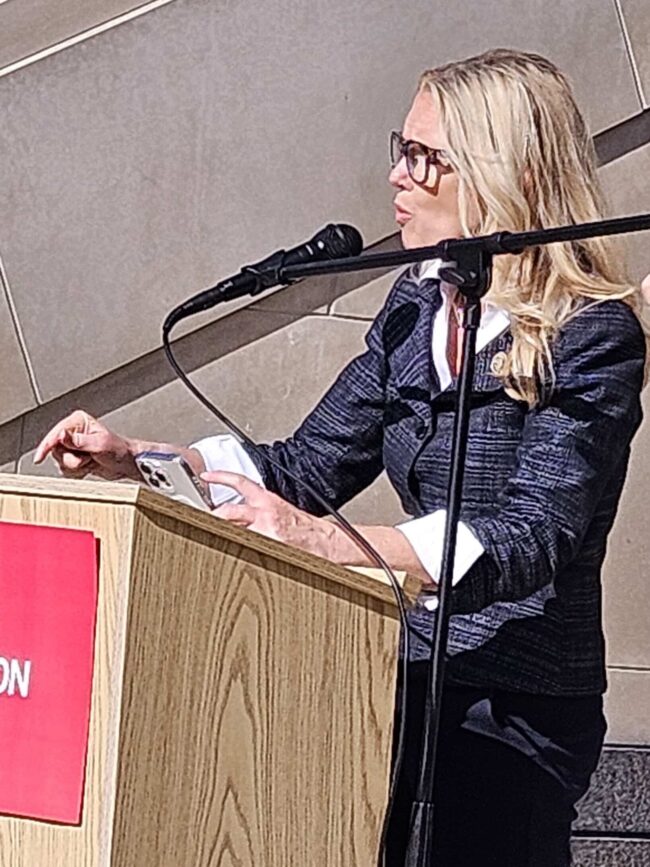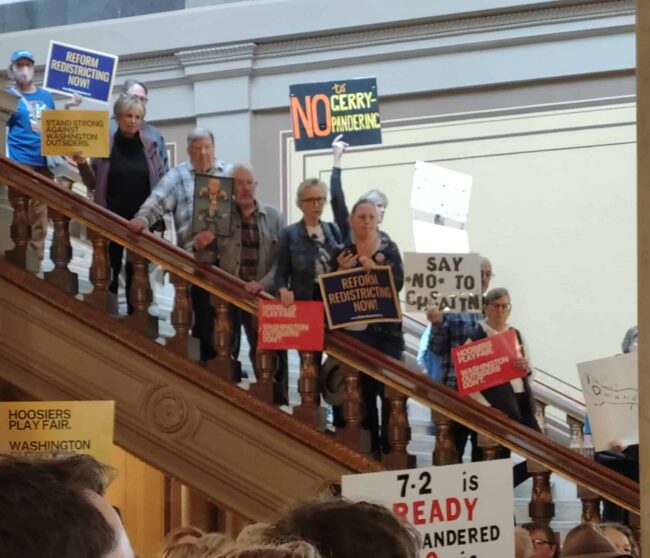
By Marilyn Odendahl
The Indiana Citizen
October 27, 2025
After weeks of anticipation, Gov. Mike Braun has announced he would sign a proclamation calling a special legislative session for the Indiana General Assembly to redraw the congressional district maps ahead of the November 2026 mid-term election.
In a statement released Monday morning, Braun said he wants the state legislature to convene Nov. 3 to consider two issues: redistricting and adjusting Indiana’s tax code to comply with federal tax laws. Braun said Indiana has to reconfigure its congressional maps in order to counter redistricting moves by Democratic states.

“I am calling a special legislative session to protect Hoosiers from efforts in other states that seek to diminish their voice in Washington and ensure their representation in Congress is fair,” Braun said in a statement. “I am also asking the legislature to conform Indiana’s tax code with new federal tax provisions to ensure stability and certainty for taxpayers and tax preparers for 2026 filings.”
The governor can only call the special session and ask the lawmakers to address certain issues, while the legislature has the power to determine when the session will actually begin, how long it will last and what will be on the agenda. Indiana House Speaker Todd Huston, R-Fishers, and Senate President Pro Tempore Rod Bray, R-Martinsville, have, so far, not released any statements regarding the special session.
However, state Democrats blasted the Republican governor’s decision. Democratic legislators highlighted polls that show a majority of Hoosiers are against redistricting and claimed Indiana Republicans are caving to the whims from President Donald Trump who has been leaning on Red states, such as Indiana, to do mid-decade redistricting in an attempt to prevent Democrats from gaining control of the U.S. House in next year’s election.
“This is not democracy. This is desperation,” Senate Minority Leader Shelli Yoder, D-Bloomington, said in a statement on Monday.
The governor and state GOP lawmakers have been under continued pressure from the Trump administration to redistrict since August, when Vice President JD Vance first traveled to the Indiana Statehouse to meet privately with Braun, Huston and Bray. Yet, while other Republican-controlled legislatures in red states like Texas and Missouri have acquiesced to the demands of the president and redrawn their congressional maps, Indiana has, so far, resisted.
In response, the White House has extended its courtship of Republican lawmakers by inviting them to Washington, D.C., in late August and sending Vance back to Indiana in early October to talk to the entire Republican legislative caucus. Trump has also been personally telephoning representatives and senators to persuade them to redraw the state’s congressional boundaries.
Indiana Republican Sens. Daryl Schmitt, of Jasper, and Scott Alexander, of Muncie, released statements Friday expressing their support for redistricting this year. Both cited the move as necessary to counter the gerrymandering in Democrat-controlled states. Recent mid-decade redistricting efforts in states such as California have been in direct response to earlier Republican efforts to redraw boundaries in red states.
“President Trump and our conservative majorities are delivering real results to improve the lives of Hoosiers and strengthen our country,” Alexander said in a statement. “We cannot sit on the sidelines while the Democrats continue to gerrymander and deny Americans fair representation in Washington, D.C. The time to take action is now.”
A mid-decade redistricting is very unusual and several members of the Republican legislative caucus have publicly stated they would not support any new congressional maps. Less than a week ago, Bray’s office said the supermajority in the Indiana Senate did not have the votes needed to redistrict. That prompted different reactions from Braun and Lt. Gov. Micah Beckwith who have both said the maps should be redrawn.
In their statements, Yoder and House Minority Leader Rep. Phil GiaQuinta, D-Fort Wayne, drew attention to concerns that families are discussing around their kitchen tables and said the General Assembly should work to provide relief to Hoosiers on such matters as housing affordability, child-care shortages, rising health care premiums and utility bills, and skyrocketing property taxes.
Yoder and GiaQuinta emphasized that Hoosiers do not want their state to be redistricted.

“Polling after polling. Event after event. Conversation after conversation. Hoosiers of all parties have made it clear they do not want this,” Yoder said. “The people said no — loudly, clearly and repeatedly. It has taken months of backroom deals, arm twisting and out of state threats against Hoosiers just to get this far. And even then, they had to fold to national bullies to do it. That is not leadership. That is cowardice.”
Two of the state’s nine congressional districts are represented by Democrats. U.S. Democratic Reps. Frank Mrvan and Andre Carson hold the 1st Congressional District, which covers northwest Indiana, and the 7th Congressional District, which encompasses most of Marion County, respectively. Whether state Republicans would try to flip both seats or just focus on turning the 1st District red, if they decide to redistrict, is not yet known and the subject of wide speculation.
Indiana Democratic lawmakers in those districts forcefully pushed back against midcycle redistricting, describing the state Republican lawmakers’ effort as rigging the congressional maps and a ploy to silence voters. Like the minority leadership, the Democrats pointed to the help Indiana families need with rising costs and accused Republicans of running from their failed policies that have hurt Hoosiers.
Also, the Democratic legislators warned of the consequences of redistricting mid-decade. They noted the GOP supermajority in the Indiana legislature just redrew the state’s congressional and legislative maps in 2021, after the most recent U.S. Census in 2020, and upending the congressional boundaries now would undermine the foundations of democracy.
“Drawing new maps five years early just to flip two seats that were fairly representative of their districts is wrong,” Sen. Rodney Pol Jr., D-Chesterton, said in a statement. “Democracy belongs to the people. If we allow politicians to keep changing the rules to benefit themselves, we lose the very essence of self-government.”

Voting-rights advocacy groups in Indiana have been persistently opposing redistricting ever since Vance’s first trip to the state. They have circulated petitions, held rallies and marches, and urged Hoosiers to let state lawmakers know they do not want the maps redrawn this year.
Although Braun has called a special session, those groups do not appear to be giving up.
Common Cause Indiana issued a statement Monday, making a direct appeal to legislators to reject any new congressional boundaries.
“Hoosiers have serious concerns they are facing due to the actions of Washington, D.C., politicians right now and drawing maps isn’t a priority for Indiana families,” Julia Vaughn, executive director of Common Cause Indiana, said. “We are urging lawmakers to reject the bullying of Trump and Braun and end the session with no new maps.”
A recent poll reflected what advocacy groups have been saying from the start of the fight over redistricting: a majority of Hoosiers do not want new maps. The poll, commissioned by Independent Indiana, a nonpartisan initiative working for competitive elections, showed 53% of Hoosiers oppose redistricting and only 24% of Hoosiers statewide have a favorable view of Braun.
“This is what happens when you don’t have competitive elections,” Nathan Gotsch, executive director of Independent Indiana, said of the special redistricting session. “It’s a blatant effort by the party in power to fix every single congressional race in their favor nearly a year before a single vote is cast.”
MADVoters Indiana said it will be mobilizing a “Statehouse Response Team” in the capitol building every day of the special session to “educate the public about the dangers of … early redistricting” and helping to prepare individuals who want to publicly testify before the legislature against redrawing the maps. Also, the organization encouraged Hoosiers to continue opposing redistricting by calling their state representatives and senators.
Amy Courtney, executive director of MADVoters Indiana, noted state Republican lawmakers could face consequences for shuffling the congressional boundaries.
“We’re immensely proud of the efforts of Hoosiers these last few months to oppose Trump’s election rigging plan,” Courtney said Monday in a statement. “Whereas we’ve seen other states quickly fold, Hoosiers have held the line for far longer. Regardless of the outcome, Hoosiers have shown that we don’t support cheaters. We will hold lawmakers accountable for their decisions.”
Dwight Adams, an editor and writer based in Indianapolis, edited this article. He is a former content editor, copy editor and digital producer at The Indianapolis Star and IndyStar.com, and worked as a planner for other newspapers, including the Louisville Courier Journal.
The Indiana Citizen is a nonpartisan, nonprofit platform dedicated to increasing the number of informed and engaged Hoosier citizens. We are operated by the Indiana Citizen Education Foundation, Inc., a 501(c)(3) public charity. For questions about the story, contact Marilyn Odendahl at marilyn.odendahl@indianacitizen.org.